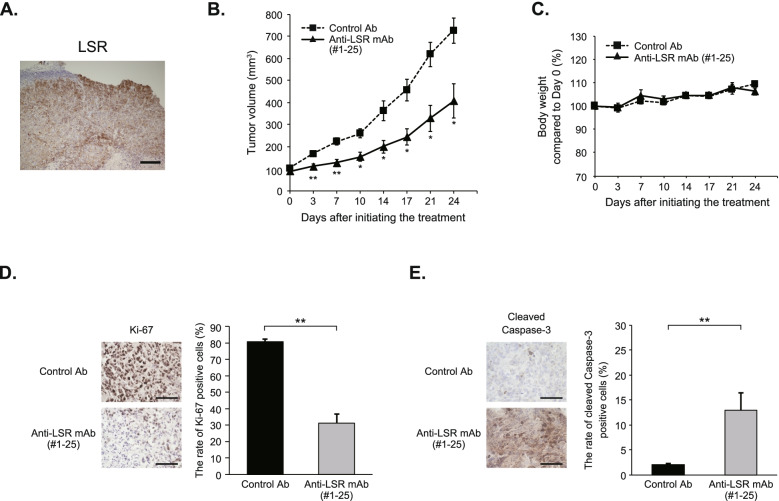Fig. 2.
Anti-LSR monoclonal antibody shows a significant antitumor effect against endometrial cancer in a xenograft model. Healthy female 6-week-old nude mice were subcutaneously inoculated with 2.0 X 106 HEC1 cells. When the tumor volume reached approximately 100 mm3, the mice were randomized into two groups (5 mice per group) and administrated with isotype control mouse IgG2a antibody (control Ab) or anti-LSR monoclonal antibody (anti-LSR mAb, #1–25) twice a week for 3 weeks. A Expression of LSR in HEC1-xenograft tumors in nude mice was confirmed by immunohistochemistry. Scale bar, 200 μm. B Anti-LSR mAb significantly inhibited tumor growth compared with the control Ab (mean tumor volume, 407.1 mm3 versus 726.3 mm3, p = 0.019). Data were shown as means ± standard errors of the means (n = 5; *p < 0.05, **p < 0.01). C No significant weight loss was observed in the mice following anti-LSR mAb administration. D The rate of Ki-67-positive cells was significantly decreased in the anti-LSR mAb-treated group compared with the control Ab-treated group (31.1% versus 80.8%, p < 0.01). Magnification, 400 X; Scale bar, 100 μm. Data were shown as means ± standard deviations (n = 5; **p < 0.01). E The rate of cleaved caspase-3-positive cells was significantly increased in the anti-LSR mAb-treated group compared with that in the control Ab-treated group (12.9% versus 2.0%, p < 0.01). These results suggest that our anti-LSR mAb exerts a significant antitumor effect associated with apoptosis in vivo. Magnification, 400 X; Scale bar, 100 μm. Data were shown as means ± standard deviations (n = 5; **p < 0.01)

